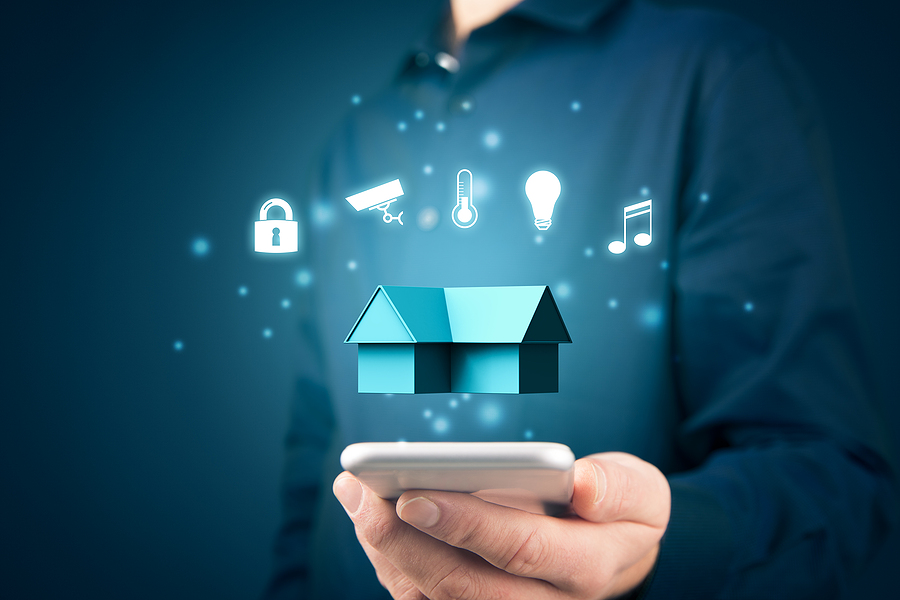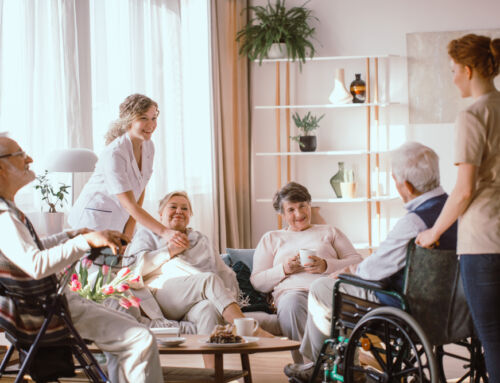According to AARP’s report “2021 Tech Trends and the 50+,” the pandemic may have been the impetus for more seniors to take the plunge into the world of smart technology. From smartphones and tablets to wearables (like Apple Watch or FitBit), more and more Americans age 50 and older are buying tech devices. But the biggest jump among this age group has been in the so-called “smart home technology” category.
Between 2019 and 2020, the percentage of seniors who own smart home technology almost doubled, jumping from 10 percent to 19 percent. Additionally, the number of seniors who own a voice-activated home assistant device (like Amazon’s Echo where you “wake up” the device by saying, “Alexa…”) went from 17 percent in 2019 to 29 percent in 2020.
Let’s take a look at how smart home technology is used and how it can benefit seniors, as well as their loved ones.
The smart home technology landscape
There are three main companies that are leading the way in the smart home technology space. You guessed it: Amazon (Alexa Smart Home), Apple (HomeKit), and Google (Nest). You’ll want to do your research before you select one of these platforms because most of the devices are not interchangeable with one another, i.e., they can’t “talk” to each other.
Many smart home devices can be connected to their respective manufacturer’s voice-activated home assistant speaker. This enables you to use voice commands to control the device. For instance, you could say, “Alexa, turn on the front porch light,” and the light would turn on. Each company also has its own smartphone app that you can use to manage your devices, similar to a remote control for a TV.
This automation — by voice command or smartphone app — is one of the most appealing aspects of these smart home technology devices. You can control them from anywhere — your sofa or bed, or even from the other side of the world! This adds not only to the convenience factor but also, in some cases, to the safety component that these devices deliver.
>> Related: Seniors Using Technology and Social Media More Amid Pandemic
Popular smart home devices for seniors
There are more and more smart home devices hitting the market, but there are a few in particular that can be useful for seniors.
Voice-activated smart home assistant speaker
Whether you want to turn on your floodlights, know the weather forecast, look at family photos, listen to your favorite song, video chat with a loved one, or find out what the capital of Tibet is, the smart speaker with video screen can do it. You also can set voice reminders for appointments or even medications. Again, the main products in this category are Amazon’s Alexa Smart Home, Apple’s HomeKit (Siri), and Google’s Nest.
Some seniors who have dexterity issues or poor vision find this voice-activated device particularly helpful in controlling their smart home technology versus using the smartphone app. This device can also reduce long-distance caregivers’ stress and burden, facilitating two-way communication and monitoring, if desired.
Smart lights and lightbulbs
Smart lights and lightbulbs enable you to turn your home’s interior or exterior lights on and off from anywhere, or set a timer, using either the smartphone app or your home’s smart speaker. There are also motion-activated smart light products, such as floodlights, some of which include a security camera. This is a great safety feature for seniors to ensure you’re not coming home to a dark house or walking into a dark room and searching for a light switch or lamp, risking a trip and fall.
Smart locks
With a smart lock, you can unlock your home’s doors without fumbling with a key using either a code or the smartphone app (depending on which lock model you choose). There are a number of scenarios where this can be convenient or increase a senior’s safety. For instance, you can create temporary codes to give to caregivers, delivery people, or maintenance workers. Also, you can give a code to family members or first responders, allowing them entry into your home in case of an emergency.
Smart doorbell
A smart doorbell allows you to see exactly who has rung your doorbell, and some models even have a speaker so you can communicate without going to the door. This is not only a beneficial device for home and personal security purposes, it also can save seniors with mobility challenges the effort of going to the door if it isn’t necessary. With a smart lock added to this equation, you can see who is at the door and decide if you want to unlock it without ever leaving your chair.
>> Related: How Technology Is Reducing Long-Distance Caregiver Burden
Senior living communities also are adopting smart technologies
As seniors get more and more tech-savvy, continuing care retirement communities (CCRCs or life plan communities) and other senior living communities are jumping on the smart home technology bandwagon, implementing smart home technology solutions that benefit their residents.
Amazon recently launched its enterprise solution called Alexa Smart Properties in one of the nation’s largest senior living providers. This program enables these communities to place Amazon’s specially designed Echo Show voice-activated video devices into residents’ units. These devices not only perform the standard tasks of other Alexa products (smart home device management, video calls, web queries, etc.), they also can perform customized skills such as:
- Allowing the community to push out announcements about events or menus
- Facilitating two-way communication between the community staff and the resident (for wellbeing check-ins, food orders, maintenance or transportation requests, etc.)
- Conducting HIPAA-compliant medication management
While seniors are increasingly comfortable with technology, some senior living communities are even creating a technology concierge role — a staff member who is available to help teach residents how to get the most out of their smart devices and troubleshoot any issues.
There are some questions around whether these types of in-home smart speaker devices go too far in terms of invading resident’s privacy. However, there are settings on each device that the resident can control — turning off the device’s camera or speaker, for example — that can help address this privacy concern. Additionally, the Alexa Smart Properties system anonymizes certain information at the administrative level to ensure residents’ privacy is respected.
>> Related: The CCRC of the Future: Technology
Smart home technology a win for seniors and their loved ones
We obviously managed for a long time without the benefits of smart home technology, but if a device can make life easier or safer, why not use it?
For seniors, there are a number of compelling reasons to adopt smart home technology: for safety, convenience, and even enjoyment. With the right smart home device set-up, seniors who are isolated, have mobility or dexterity challenges, or have memory issues can live in their home more safely, happily, and easily. This also has the potential added benefit of alleviating loved ones’ and/or caregivers’ concerns, making it a solution that benefits all parties.






